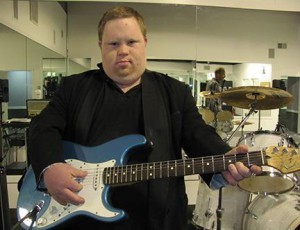No #JusticeForEthan - Two Years Later
Two years ago, tonight, three off-duty deputies moonlighting as mall security killed Ethan Saylor.
His experience stays with me throughout my writing on police violence and disability, though, often on my mind. One of so many victims, but the victim that made it clear to me that perhaps I could help reframe the problem not as one of bad cops, and not as one of requiring special treatment, but of fundamental human rights and fundamental shifts to the way police respond to non-compliant but non-threatening situations.
- They killed Ethan Saylor by forcing him to the ground, fracturing his trachea.
- They killed him because they couldn't figure out how to deal with a large, cursing, man with Down syndrome.
- They killed him because no one in the theater, some of whom recognized that Ethan had Down syndrome, volunteered to buy him a ticket.
- They killed him because he didn't fit their idea of people with Down syndrome as cute little kids and they didn't know what to do with a man, cursing at them, not complying.
- They killed him because they couldn't wait for his mother to arrive, although she was on the way, and Ethan's aide told them this. But non-compliance, for many officers, requires the use of force. So they used force, and he died.
These last two issues - representations of Down syndrome as cute/children (usually white) and the necessity felt by many law enforcement officers to respond to non-compliance with force - have been pretty much the central themes of my writing for most of the last two years. I think about Ethan Saylor and his family a lot, but especially today.
I have three published pieces on him.
- When Cops Criminalize the Disabled (TheNation.com, 8/1/2013)
- Ethan Saylor: Disability Rights are Universal Human Rights (CNN.com, 8/29/2013).
- Police Violence Sparks Disability Rights Movement (Al Jazeera America, 12/22/14)
- And discuss him in this co-written piece as well: Police Violence and Disability, with Lawrence Carter-Long (TheAtlantic.com, 5/6/14)
His experience stays with me throughout my writing on police violence and disability, though, often on my mind. One of so many victims, but the victim that made it clear to me that perhaps I could help reframe the problem not as one of bad cops, and not as one of requiring special treatment, but of fundamental human rights and fundamental shifts to the way police respond to non-compliant but non-threatening situations.
I'm sorry I never got to meet Ethan. I'm sorry that while there's been a lot of progress since his death and good outcome have emerged, none of those outcomes include holding the deputies or their supervisor


0 komentar:
Post a Comment